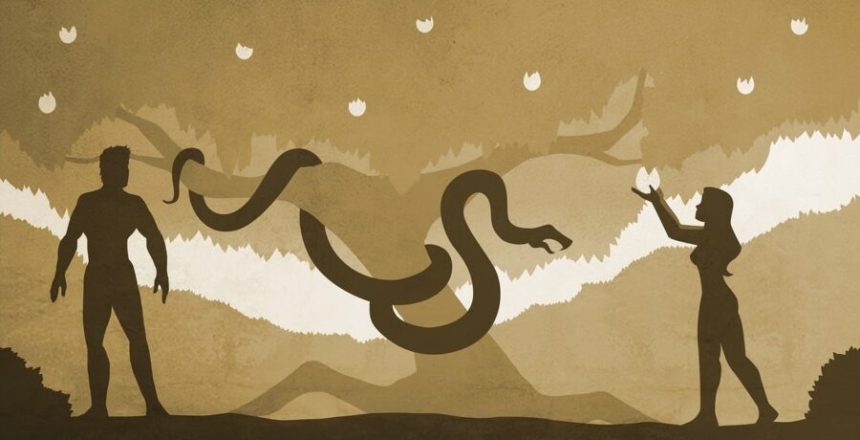Introduction
Genesis 3 gives the account of why the world is in its current fallen state. It explains how sin, hardship, and death can now be found in the midst of the good and beautiful creation of God. God, in his sovereignty, decided to give mankind a choice. Would we would fully trust him or go our own way. The tree of knowledge of good and evil was that choice. Adam and Eve found themselves faced with temptation that was exacerbated by the wily attack of the serpent. In the end, they yielded to that temptation and introduced sin, distrust, and despair into the world that God had created.
God’s response was swift and firm but tempered with mercy and hope. Man has broken the world, his nature, and his relationship with the creator through sinful disobedience of God’s word. We rebelled against the Sovereign Creator in His own kingdom. But hope would come in the form of a savior, the seed of the woman who would conquer sin and defeat death and who will eventually usher in a new heaven and earth.
Genesis 3:1
The account of the Fall of man in Genesis 3 begins with Adam and Eve in the garden that God had prepared for them at creation. They were naked and unashamed (Gen. 2:25). This is significant because it indicates that they lived in the perfect temperate environment (paradise). Additionally, this conveyed that, without sin, they lived in perfect trust and safety with one another.
It is in Genesis 2:16-17 that God instructed Adam that he was free to eat of all the trees of the garden except one. Ultimately, it was this command that would prove problematic for the first couple.
The Serpent
The serpent is introduced in Genesis 3:1 as the most cunning or shrewd of all the animals. Many debate who or what this creature actually was. Some see the serpent as symbolism for evil rather than being the actual devil. However, the identity of the serpent is revealed in Rev. 12:9. Here he is called the ancient serpent also known as the devil or Satan. Given this insight coupled with the physical nature of the curse in Gen 3:14 and the spiritual nature of the curse in Gen. 3:15, the best understanding is that the serpent was a real animal that was indwelt by Satan.
His first order of business in this passage was to question and distort the word of God. The serpent not only distorted God’s words, but he also subtly introduced the idea that God was selfish and spiteful for his command. This manipulation by the serpent introduced doubt about God’s motives. Victor Hamilton also notes that the Hebrew word for “you” used in this passage is in the plural form indicating that Adam was also present with Eve while the conversation with the serpent was taking place.[1]
Genesis 3:2-3
It’s unclear why it was Eve who responded, but they were now confronted with the choice to stand firmly by the words of God or to succumb to temptation. Eve here demonstrated an inclination toward the latter as she slightly misrepresented God’s instruction by adding to it. By removing the words “freely” and “Surely”, she minimized the vast provisions that God have given them while also dismissing the certainty of the consequences for disobedience. So Eve here took the first steps toward disobeying God by slightly altering his word and the nature of his commands.
Genesis 4-5
The serpent then took the subtle modification of God’s instruction by Eve to the next level. He overtly contradicted both God’s words and his motives. In doing this, the serpent tempted Adam and Eve with that which has tempted mankind down through the ages and continuing through today. Allen Ross points out that the first lie was the idea that there can be disobedience without consequence.[2] The next lie was that God was trying to hold them back because he was selfish, and he had ill will against them. The serpent was tempting them with both autonomy and deity. In other words, they could be free from the rule of the Creator God and be gods unto themselves.
Beginning with Adam and Eve and continuing throughout time the tempter has dangled in front of man that which entices him to succumb to his own selfish desires to the neglect of God’s will and purpose. It is crucial to understand that what is revealed here is that Satan doesn’t make people do bad things. He merely entices us with what our hearts already desire.
Thus, Adam and Eve, as well as all of mankind, are not victims but are fully accountable for their own actions. It is worthy of note that the fall into sin still occurs the same way today. We first subtly modify the Word of God because it makes people feel better. Eventually we twist and mangle it beyond all recognition before it is outright denied as truth. This has always been mankind’s pathway to destruction.
Genesis 6-7
This account reveals simply that Eve ate of the tree and that she gave to Adam, who was present and needed no convincing, to eat also. Genesis 2 clearly indicates that God had provided for every need of the first couple. They were placed in a lush garden (Gen. 2:8, 15) with food and water. It can be reasoned, given that they had access to the tree of life and given the nature of the curse introducing physical death in Gen. 3:19, that they would have lived indefinitely in their initial created state.
By yielding to temptation and eating of the forbidden tree, they traded life for the lie that autonomy from God would bring them god-like power over their own lives. The initial fallout of their sin was immediately recognized as their newfound knowledge gave them shame instead of dignity. Their newly acquired understanding came with a discomfort with their own bodies and a distrust for one another and God leading them to immediately try to cover themselves.
Genesis 8-9
The fallout of their sin began immediately. Their eyes were opened, and they felt shame. Another immediate effect of their sin was to disrupt their relationship with their creator. As they heard the Lord approaching them, they felt a new overwhelming sensation, fear. Up until this point, the approach of God would have been a welcomed event. However, Mitchell L. Chase explains that in the aftermath of their willful disobedience and rejection of His authority, they knew that judgment was approaching.[3]
So, attempting to flee or avoid God’s righteous presence, they hid themselves among the trees of the garden. God’s question was an interesting one as it would seem futile to attempt to hide form God. So why would God even ask the question when Scripture is full of passages (Ps. 147:5, 1 Jn 3:20, Heb. 4:13) testifying to the omniscience of God?
God’s question can be more accurately described as rhetorical. In this moment, He was not seeking to command the couple but He was seeking to draw them out. This method is reminiscent of the questions Jesus often asked in the New Testament Gospels.
Genesis 10-11
Adam’s response to God revealed in part his current condition while also attempting to avoid his true transgression. This is clear because Adam explained that he was hiding due to his nakedness despite having already covered himself with fig leaves. It’s not uncommon for those who find themselves guilty of crime to readily admit the lesser crime or predicament as a way of avoiding the truth of the more significant underlying crime.
God, in his infinite wisdom, cuts right through this attempt at obfuscation and gets right to the issue at hand. God, already knowing what had occurred, could have condemned them here. Instead, he allowed them the opportunity to confess their sins. He gave them the chance to come clean and face up to what they had done. In the midst of this disaster that is unfolding and the judgement that ensues, God’s patience and mercy are present.
Genesis 12-13
Adam’s response to God’s direct question is still typical of the human condition today. Adam, confronted by the truth of what he had done, attempted to deflect the blame and minimize his involvement in the whole affair. The damage to the trust relationship between the man and the woman that was partially displayed by their hiding their own nakedness from one another was now on full display.
At first glance, it appears that Adam attempted to avoid culpability by blaming Eve. However, on closer look, it becomes clear that he was implying that she was merely the conduit and that the true responsibility for this mess rested with God, himself. This is an example of Adam attempting to play the victim in order to deflect blame from himself to others.
So, God moved on to questioning the woman even though it would soon be obvious that he did not fall for this ruse. Eve takes the same takt as her husband. In an effort to evade responsibility, she pushes blame off on the serpent who tempted her. Allen Ross points out that, although Adam and Eve were technically correct in tracing the order of events from the serpent to Eve, and finally to Adam, in the end they both confessed their crimes with the two words, “I ate.”[4]
Genesis 14-15
God first addressed the serpent. Notice that God didn’t interrogate the serpent. The two-part curse on the serpent makes it clear that there was more than just an animal present. He goes on to imply that it appears to be a literal animal in view and that the first part of the curse is directed toward the animal. [5] The form prior to the curse is unclear.
Victor Hamilton takes this to be symbolic as he asserts that even ancient peoples didn’t believe that snakes literally ate dust. Thus, he reasons, the serpent being made to crawl on his belly shouldn’t be taken anymore literally than his diet being changed to dust.[6] Regardless of one’s stance on this, it is likely that the serpent would occupy a place of lowliness and humility going forward.
God goes on to curse the Satanic presences as well. This is what we call the Protoevangelium. This was the first Messianic prophecy. The singular “he” in this passage refers to a specific offspring of the woman, Christ Jesus, who would defeat sin and death, dealing the victorious blow against the forces of evil at the cross.
Genesis 16
Mitchell Chase makes the connection between the first part of the punishment for the woman and the blessing and command of God given in Gen 1:28. He points out that the blessing of 1:28 was not nullified but it would be carried out with great pain.[7] The second aspect of the curse for the woman was that her desire would be for her husband. This is a difficult passage to fully understand.
In some cases, it is assumed that this means that Eve would sexually desire her husband even though it would lead to the pain of childbirth. However, when coupled with the next statement, it makes more sense that the desire of the woman would be to rule over her husband, and he would try to rule over her. The result is that the relationship between men and women would be tainted by sin and would be full of contention and dispute.
Genesis 17-19
Finally, God dealt with Adam, the one whom the conversation started with. It’s interesting that God, in telling Adam the reason for his punishment, not only tied it to the eating from the tree but he also connected it to his listening to the words of his wife over the words of God. The text doesn’t indicate that Adam was tricked into eating by Eve. He ate of his own free will.
So, man’s punishment was that going forward he would eat through great work and anguish. The cursing of the ground meant that it would no longer effortlessly produce that which we needed but would resist. Man would have to toil greatly with the soil to provide food for his family. In the end, man’s relief from his toil would come when he died and returned to dust.
The oracles thus all reflect talionic justice: they sinned by eating, and so would suffer to eat; she led her husband to sin, and so would be mastered by him; they brought pain into the world by their disobedience, and so would have painful toil in their respective lives; and the serpent ruined the human race, and so he would be destroyed.
Allen Ross
Here can be seen the consequence of sin and disobedience. Yet God’s harsh dealing with mankind is tempered with his mercy and grace as they look to the future and the one who would make all things right again.
Conclusion
The account of the fall of man in Genesis chapter 3 is central to the story of scripture and to the gospel of Jesus Christ. We cannot sacrifice it to the realm of legend and myth. We find within this account the origin of man’s sinful and broken nature and the need for a savior. Without the fall there would be no need for Jesus to die because there would be no need for a savior. The anchoring of Christian theology to Genesis 3 is paramount to a full understanding of what Christ has done.
We can see the very characteristics and tendencies of man in this account. Humans are not evolutionary beings. Mankind succumbs to the same temptations today that Adam and Eve fell prey to in the Garden. Everyone, deep down, desires their own autonomy and control. Man continues to seek to be a god unto himself and to have his every selfish desire fulfilled. Everyone desires to do what is right in their own eyes (Jud. 17:6, Jud. 21:25). In doing so, man distorts the teachings and commands of God.
Introducing heresy into God’s word
Like the interaction between the serpent and Eve, many begin the descent into sin by subtly altering the words of God. This introduces heresy and ungodliness that eventually leads to the full twisting and denial of the very words of God. When the chips are down, man still doesn’t take responsibility for his sin, but he seeks to pass off the blame to others, including God. This leads down the pathway to sin and destruction as was seen in the Genesis account.
But just like in the Genesis 3 account, there is hope in the future. The Lord Jesus Christ, the seed spoken of, has conquered sin and death and will one day make the world new and return those who accept him to his presence forever.
[1]. Victor P. Hamilton, The New International Commentary on the Old Testament: The Book of Genesis Chapters 1-17 (Grand Rapids, MI: Wm. B. Eerdmans Publishing Co., 1990), 191.
[2]. Allen P. Ross, Creation and Blessing: A Guide to the Study and Exposition of Genesis (Grand Rapids, MI: Baker Academic, 1996), 135.
[3]. Mitchell L. Chase, “God’s Judgement on His Blessing: How Genesis 1:28 Informs the Punishments on Adam and Eve,” Journal for Biblical Manhood and Womanhood 018, no. 1 (Spring 2013), 16. https://www-galaxie-com.us1.proxy.openathens.net/article/jbmw018-1-006.
[4]. Ross, 144.
[5]. Ross, 145.
[6]. Hamilton, 197.
[7]. Mitchell L. Chase, “God’s Judgement on His Blessing: How Genesis 1:28 Informs the Punishments on Adam and Eve,” Journal for Biblical Manhood and Womanhood 018, no. 1 (Spring 2013), 16. https://www-galaxie-com.us1.proxy.openathens.net/article/jbmw018-1-006, 17.



3 thoughts on “GENESIS 3: THE FALL”
Pingback: Why the Tree of Knowledge? - Questions in Theology
Pingback: Happy Thanksgiving: A Grateful Heart - Questions in Theology
Pingback: The Creation of Man - Questions in Theology